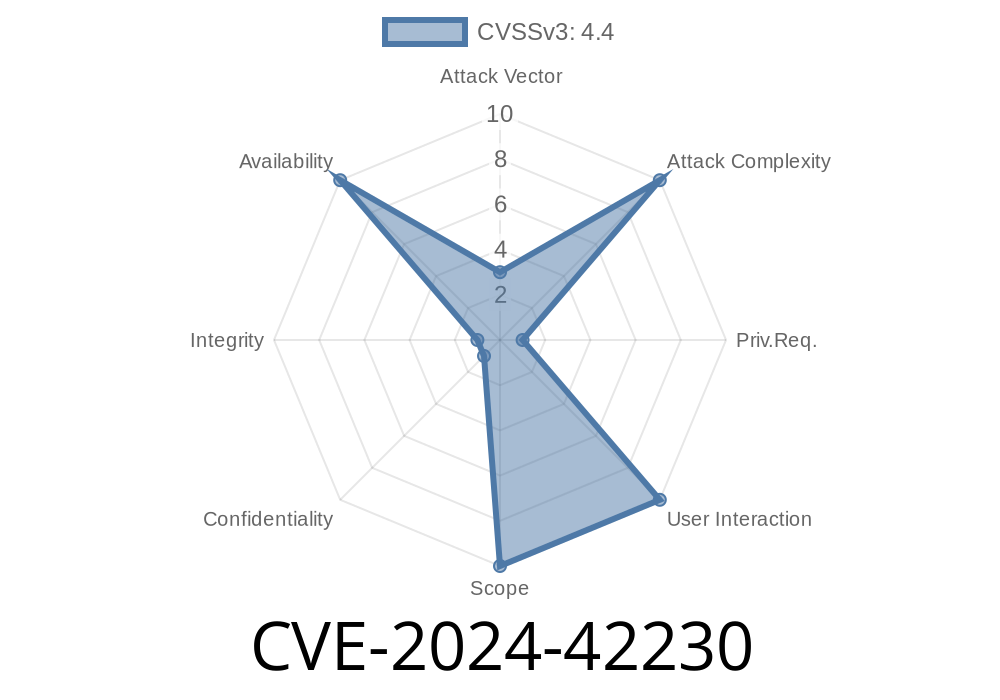The world of Linux is built on stability and scalability, but even the kernel’s deepest code can hide subtle vulnerabilities. One such issue, tracked as CVE-2024-42230, surfaced in the support for kexec—a mechanism by which you can boot into a new Linux kernel straight from the currently running one—on IBM’s PowerPC pseries servers. This post breaks down what went wrong, how it could cause a crash, and how the kernel community fixed it. We’ll keep the technicalities light and link to all the key information.
What is CVE-2024-42230?
In simple terms, CVE-2024-42230 is a kernel crash bug. On IBM PowerPC servers running Linux (the "pseries" architecture), using kexec could cause a kernel panic due to a subtle sequence error related to instructions called scv and the Address Interrupt Level (AIL).
kexec: Fast-booting into a new kernel without full hardware reboot.
- scv instruction: A system call vector instruction, new in POWER CPUs, allowing efficient syscalls.
- AIL (Address Interrupt Level): A CPU mode affecting how exceptions are handled—critical for scv to work properly.
The Bug: Race Condition During Kexec
When you trigger a kexec reboot on a pseries machine, the kernel has to carefully shut down CPUs and hardware state. In the buggy code, the kernel disables AIL too early—before all other CPUs are stopped. If any CPU (other than the main one) tries to execute an scv instruction while AIL is off, the CPU generates an interrupt at an unexpected spot in the memory map. This causes a hard crash.
Here’s a simplified version (pseudocode)
// Bad sequence before the fix:
disable_AIL(); // Step 1: AIL is turned off
bring_down_other_CPUs();// Step 2: Other CPUs are stopped *afterwards*
While *other* CPUs are still running, AIL is already disabled, leaving a window for scv to cause trouble.
Why Does This Crash the Kernel?
PowerPC CPUs expect that, with AIL off, they can't safely execute scv. Normally, the interrupt vector for scv is at a *very high memory address* (x17000). The kernel's early startup code isn't ready to handle interrupts at this location—so it crashes.
The reason? That startup code runs in a tiny, fixed part of memory and the logic to handle such high interrupt vectors just isn’t there. So execution "jumps" somewhere unknown, causing a panic or hang.
The patch changed the shutdown order so *all* other CPUs are stopped before AIL is disabled
// Corrected sequence after the fix:
bring_down_other_CPUs(); // Step 1: Stop the other CPUs FIRST
disable_AIL(); // Step 2: Now disable AIL (safe, all CPUs down)
Now, there’s no chance for stray scv instructions to cause misdirected kernel crashes.
Here’s the relevant patch snippet for clarity
// Old code: disables AIL before stopping CPUs
disable_ail(); // AIL disabled too early!
stop_other_cpus();
// New code: stops CPUs first, then disables AIL
stop_other_cpus();
disable_ail();
Exploit Details
Is this a security disaster? Not really—it’s a stability bug more than an avenue for privilege escalation or remote code execution. There's no direct way for an attacker to exploit this unless they already have root access and can run kexec (which is privileged). However, it *does* mean a root user could crash the server at will via a crafted kexec process, which could be a component in a broader denial-of-service attack.
In testing labs or hosting providers using kexec for quick kernel updates, strange crashes during upgrades on pseries systems might be linked to this vulnerability.
References
- Kernel patch commit on lore.kernel.org
- Kernel commit on git.kernel.org
- Red Hat advisory for CVE-2024-42230
- scv instruction documentation (IBM)
Conclusion
CVE-2024-42230 is a reminder that even established kernel paths like kexec can trip over new CPU features. If you run Linux on PowerPC pseries and use kexec, make sure you’re running a kernel with this fix to avoid mysterious crashes during kernel upgrades.
If you found this useful, share it with your sysadmin friends—kernel safety is a team effort!
Timeline
Published on: 07/30/2024 08:15:08 UTC
Last modified on: 07/30/2024 19:32:51 UTC
